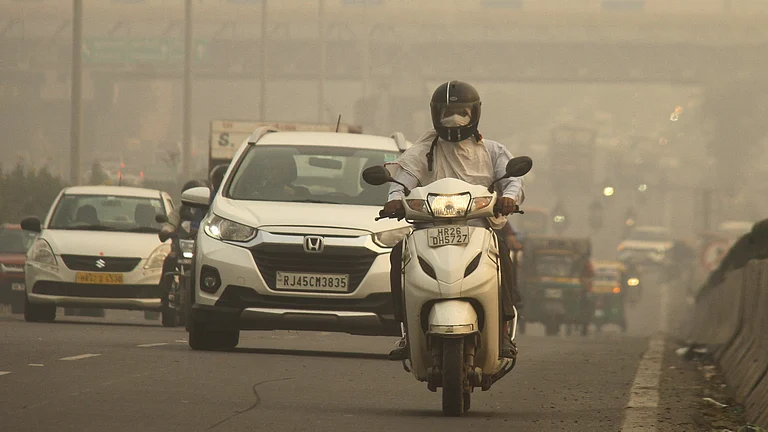Delhi's AQI reaches 344, triggering Stage 4 of GRAP enforcement.
Heavy vehicle ban and construction activity suspension under Stage 4 GRAP.
SC calls for stricter stubble burning control to combat pollution in Delhi-NCR.
Deteriorating Air Quality in Delhi-NCR Sparks False GRAP 4 Reports, SC Urges Action on Stubble Burning
Pollution surge in Delhi-NCR triggers fake GRAP-4 claims; SC pushes stricter checks on stubble burning
The Commission for Air Quality Management (CAQM) issued a clarification on November 18 stating that Stage-4 reports are “misleading”, according to Hindustan Times.
CAQM further said that Stage 3 of the Graded Response Action Plan (GRAP) remains the operative level across Delhi. It advised both the public and news platforms to rely only on official CAQM updates and press releases.
Several social media posts and media reports claimed that GRAP Stage-4, had been enforced in the morning hours of November 18.
How GRAP Stage 4 Works
The stage 4 of GRAP bans entry of heavy vehicles from other states in Delhi, along with banning all construction activities. In addition, it also mandates shifting of classes, except for classes 10 and 12, to hybrid mode. However, trucks carrying essential commodities and providing essential services will be allowed. All CNG, Electric and BS-VI Diesel trucks will also be permitted to enter Delhi.
During winters, the Delhi-NCR region enforces restrictions under GRAP, which categorises air quality into four stages – Stage 1 (Poor, AQI 201-300), Stage 2 (Very Poor, AQI 301-400), Stage 3 (Severe, AQI 401-450), and Stage 4 (Severe Plus, AQI above 450).
Forecast for Delhi-NCR
Delhi recorded 'very poor' air quality in the morning of November 18, with the city's AQI touching 344 and four stations reporting 'severe' pollution levels, PTI reported citing Central Pollution Control Board (CPCB) data.
Out of 37 monitoring stations, Bawana (426), Wazirpur (412), Jahangirpuri (418) and Vivek Vihar (402) were in the 'severe' range.
According to the forecast, the air quality is expected to remain in the 'very poor' category over the next few days.
An AQI between 0 and 50 is considered "good", 51 to 100 "satisfactory", 101 to 200 "moderate", 201 to 300 "poor", 301 to 400 "very poor" and 401 to 500 "severe", as per the CPCB classification.
On the weather front, the minimum temperature settled at 9.6 degrees Celsius, 2.7 notches below t
The season's average and the maximum temperature is likely to hover around 26 degrees Celsius.
SC Bats for Long-Term Solution
Meanwhile, the Supreme Court on November 17 refused to impose year-round restrictions on all activities prohibited under the Graded Response Action Plan (GRAP) – a set of emergency measures to control pollution.
The top court asked the Punjab and Haryana governments to strictly follow the directions of the Commission for Air Quality Management (CAQM) on the issue of stubble burning in the two states.
"If the CAQM's suggestions to Punjab and Haryana are implemented, then stubble burning can be adequately tackled. Thus, we direct both states to have a combined meeting and ensure that the CAQM's suggestions are scrupulously implemented," a bench comprising Chief Justice B R Gavai and Justices K Vinod Chandran and N V Anjaria said.
(With inputs from PTI.)

